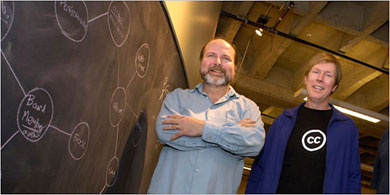ADDENDUM TO "ARISTOTLE": (THE KNOWLEDGE WEB)
[W. DANIEL HILLIS:] In the spring of 2000, while I was writing the Aristotle essay, Jimmy Wales and Larry Sanger began taking a much more practical approach to a similar problem. Their project, called Nupedia, was an attempt to create a carefully edited encyclopedia of the world's knowledge that would be available to anyone, for free. The Nupedia project made some progress, but the going was slow. About a year later, they put a wiki on the web, allowing anyone to contribute feed material to Nupedia. That feeder project was called "Wikipedia". What happened next is a piece of History that should make us turn-of-the-millennium humans all feel proud.
While all this was going on, I continued to plug away, trying to build a prototype of the more structured, computer-mediated knowledge base that is described in the essay. Comments from my friends, including those posted on Edge, helped me realize that trying to build a tutor and a knowledge base at the same time would be biting off way too much. So, I decided to concentrate on the "Knowledge Web" part of the problem. Even that seemed to be an uphill battle, because the collapse of the dot-com boom dimmed the funding prospects for all things connected. It was not a good time for ambitious ideas.
Or maybe it was a good time. It was during this period, undistracted by the frenzy of a boom, that Google and Wikipedia were able to build spectacularly ambitious tools that made us all smarter. Eventually, their success reminded everyone that the information revolution was just beginning. There was renewed enthusiasm for ambitious dreams. This time, I was better prepared for it, having met, during the interim, a great product designer (Robert Cook) and a great engineer (John Giannandrea), both of whom shared the dream of building a connected database of human knowledge that could be presented by computers, to humans.
In retrospect the key idea in the "Aristotle" essay was this: if humans could contribute their knowledge to a database that could be read by computers, then the computers could present that knowledge to humans in the time, place and format that would be most useful to them. The missing link to make the idea work was a universal database containing all human knowledge, represented in a form that could be accessed, filtered and interpreted by computers.
One might reasonably ask: Why isn't that database the Wikipedia or even the World Wide Web? The answer is that these depositories of knowledge are designed to be read directly by humans, not interpreted by computers. They confound the presentation of information with the information itself. The crucial difference of the knowledge web is that the information is represented in the database, while the presentation is generated dynamically. Like Neal Stephenson's storybook, the information is filtered, selected and presented according to the specific needs of the viewer.
John, Robert and I started a project, then a company, to build that computer-readable database. How successful we will be is yet to be determined, but we are really trying to build it: a universal database for representing any knowledge that anyone is willing to share. We call the company Metaweb, and the free database, Freebase.com. Of course it has none of the artificial intelligence described in the essay, but it is a database in which each topic is connected to other topics by links that describe their relationship. It is built so that computers can navigate and present it to humans. Still very primitive, a far cry from Neal Stephenson's magical storybook, it is a step, I hope, in the right direction.


